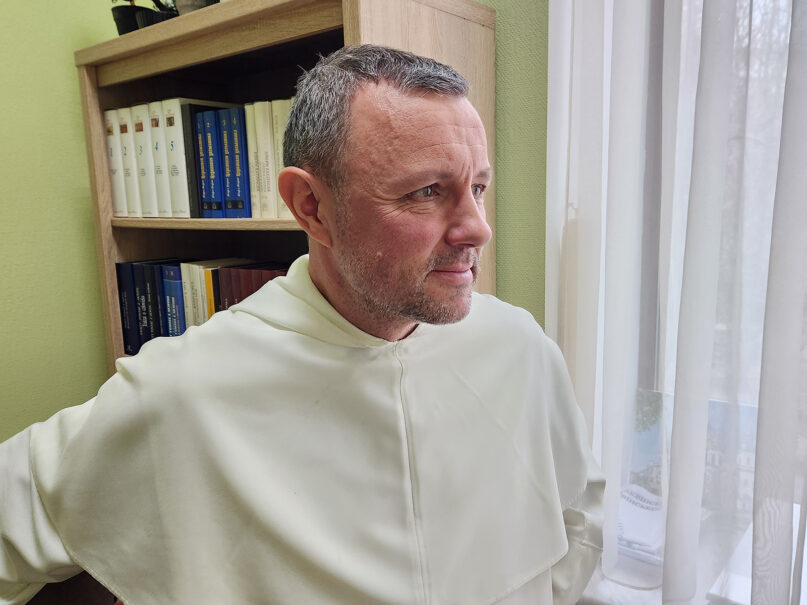
Dominican Fr. Petro Balog, seen in a 2024 photo, heads the Institute of Religious Sciences of St. Thomas Aquinas in Kyiv, Ukraine. web (GSR photo/Chris Herlinger)
One of the few upsides, if it can be called that, of covering the war in Ukraine for the past three years has been witnessing the passionate resolve of Ukrainians in their hope for victory over the Russian threat. This is as true of Ukrainians in refugee centers along the Polish border as it is in Catholic convents in the western city of Lviv, and near the front line around Zaporizhzhia. It has been remarkable and inspiring.
But Catholic clergy in the country say that sustaining that hope is not easy, even as Ukraine's recent history points to a "resurrection-like" resilience.
Sr. Veronika Yaniv, a member of the Sisters Catechists of St. Anne in Lviv, told me in early December, "The strength of our people is in God.
"We believe and trust in God because we know that truth will always triumph over lies, and freedom will triumph over violence," she said, "and that sooner or later the Lord will give us this freedom and independence for which we fight and ask, because the Lord created us free and wants us to remain so."
But as the third anniversary of Russia's full-scale invasion looms, civilians and combatants alike are tired of blood and muck, loss and terror. "People feel helpless and there is war fatigue," Dominican Fr. Petro Balog, who heads the Institute of Religious Sciences of St. Thomas Aquinas in Kyiv, said in an email last week, noting that air raid sirens are sounding daily in the capital, Kyiv, and across Ukraine. News emanating from Washington has added to the gloom. The Trump administration's pursuit of a peace deal with Russia, with no or few plans for Ukrainian participation, seemed to accede to Russia's requirement that Ukraine not join NATO, a key Russian goal in the war.
Referring to the White House's pivot, Balog said in an email Wednesday (Feb. 19): "The news is disappointing — partners betray, dictators and occupiers go unpunished, and even become new partners, while the victim of occupation is somehow at fault because it 'could have negotiated and avoided war.' The absurdity knows no bounds."
All of this prompts alarm and worry among Ukrainians who, Balog said, "would never voluntarily agree" to permanent Russian control of areas they now occupy, since they believe that the specter of cultural genocide — of a repression in which Ukrainian identity would be erased — remains a real threat.
"Few still speak of victory in this war," Balog said. "There is not enough Western support to win, only just enough to survive."
The echoes of World War II are hard to miss and still reverberate in Ukraine. A Ukrainian Catholic sister I met on assignment in 2023 and whose ministry, like that of so many others in the last three years, has been focused on helping those displaced by the Russian onslaught shares the worry about appeasement, to the degree that she asked not to be identified lest the occupiers seek out those who speak out.
It is difficult to live with the uncertainty. "Everything is so unclear," the sister told me in an email last week. But she knows that Ukrainian victory is dependent on outside assistance. She hopes that somehow the United States won't forget Ukrainian aspirations.
Prayers must continue, the sister told me, as "everything is first of all in the hands of God and only He can perform a miracle for us."
Balog spoke similarly, saying, "We firmly hope that the Lord God is with us." God will not abandon Ukraine or its people, the priest said, and "we will not lack (God's) blessings and grace."
Advertisement
He added: "God is in this world; His providence governs all, even if His will is not always carried out by human hands. And above all, God is present and suffers with those who suffer, He remains with those who lose hope, He dies with the dying. But He does not abandon them. We deeply believe this."
He continued: "We are convinced that, in the end, God's justice will prevail. Whether we witness it or it comes after us — it does not matter. But we believe that God is capable of bringing forth even greater good from any evil, as St. Augustine once affirmed."







